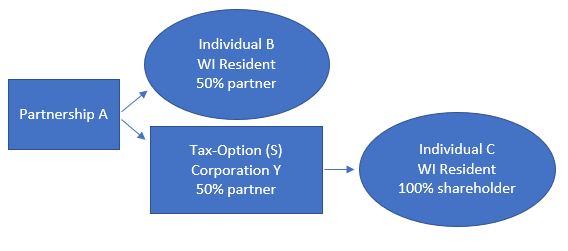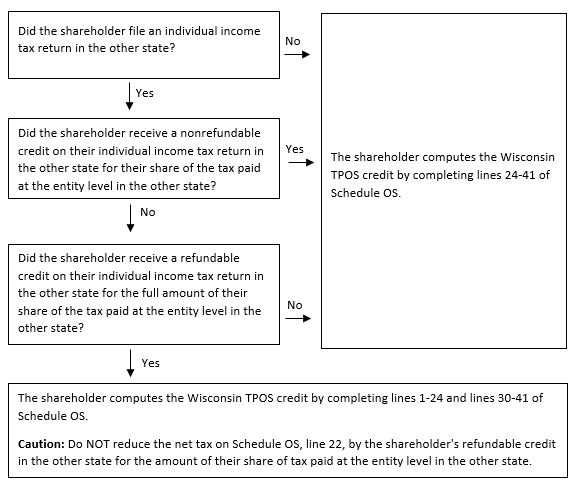-
How will making the election impact a shareholder's adjusted basis in their stock and indebtedness of the tax-option (S) corporation?
The adjusted basis of a shareholder in the stock and indebtedness of an electing tax-option (S) corporation is determined as if the election was not made, as provided in sec.
71.365(1)(b), Wis. Stats.
-
Can shareholders use the Wisconsin manufacturing and agriculture credit from an electing tax-option (S) corporation to offset their Wisconsin individual income tax liability for the same taxable year?
No, a shareholder may only use the manufacturing and agriculture credit to offset their tax liability resulting from their prorated share of the tax-option (S) corporation's income as provided in sec.
71.07(5n)(c)3., Wis. Stats. Since a shareholder of an electing tax-option (S) corporation does not have income and resulting tax from the tax-option (S) corporation in the year of the election, the shareholder cannot use the credit to offset their income tax liability from other sources of income. The shareholder may carry forward the credit for 15 years and use the credit to offset tax liability resulting from the shareholder's prorated share of taxable income from the tax-option (S) corporation for a year in which the election is not made.
-
If a tax-option (S) corporation elects to pay tax at the entity level, can an individual Wisconsin resident shareholder claim a credit for taxes paid to another state on the income from the electing tax-option (S) corporation?
No, an individual resident shareholder may not claim a credit for taxes they paid to another state against Wisconsin income taxes paid by the entity.
-
How is the Wisconsin credit for taxes paid to other states (TPOS) calculated if a lower-tier entity made the entity-level tax election but the upper-tier entity did not make the entity-level tax election?
See example below.
Organizational Structure:

Facts:
-
How is the Wisconsin credit for taxes paid to other states (TPOS) calculated if the tax-option (S) corporation does not have nexus in Wisconsin, does not file a Wisconsin income/franchise tax return, and makes an election to pay tax at the entity-level in another state?
See the flow chart below.
Note: The flow chart assumes the shareholder is a resident of Wisconsin and the shareholder's only items of income, gain, loss, and deduction are from the tax-option (S) corporation. See the
Schedule OS instructions for more information.

-
If a tax-option (S) corporation elects to pay tax at the entity level, are individual shareholders required to file a Wisconsin individual income tax return if they have no income reportable to Wisconsin?
No, individual shareholders of an electing tax-option (S) corporation that do not have any income reportable to Wisconsin are not required to file a Wisconsin individual income tax return. However, shareholders must timely file a Wisconsin income tax return to claim credits or refunds.
-
If a tax-option (S) corporation elects to pay tax at the entity level, are estate or trust shareholders required to file a Wisconsin Form 2,
Wisconsin Fiduciary Income Tax for Estates or Trusts, if they have no income reportable to Wisconsin?
Yes. According to sec. 71.13, Wis. Stats., "annual returns of income of an estate or a trust shall be made to the department by the fiduciary thereof at or before the time such income is required to be reported to the internal revenue service under the internal revenue code."
-
Are shareholders of an electing tax-option (S) corporation required to include their Schedule 5K-1 with their Wisconsin individual income tax returns?
Yes, an individual is required to include a copy of the Schedule 5K-1 with their Wisconsin individual income tax return.
Note: Certain credits may be passed through to shareholders, in which case the processing of a shareholder's tax return may be delayed if the Schedule 5K-1 is not included with the return.
-
If a nonresident of Wisconsin is a shareholder of two tax-option (S) corporations and only one makes the election to pay tax at the entity level, can the nonresident shareholder participate in the Wisconsin composite return, Form 1CNS, of the non-electing tax-option (S) corporation?
The shareholder may participate in the Wisconsin composite return if its only remaining source of Wisconsin income is from the non-electing tax-option (S) corporation, the shareholder is not filing a separate Wisconsin income tax return for the same taxable year, and otherwise qualifies to participate in the composite return as provided in the
Form 1CNS instructions.
-
What items reported on a Schedule 5K-1 from an electing tax-option (S) corporation can a shareholder claim on their income tax return?
- A shareholder may claim most credits passed through from the electing tax-option (S) corporation reported on Schedule 5K-1 lines 13a through h.
Caution:
- Shareholders may not use the taxes paid by an electing tax-option (S) corporation, including taxes paid on the shareholder's behalf on a composite return, to compute a credit for tax paid to another state. In addition, a resident shareholder may not claim credit for taxes they paid to another state on income taxed at the entity level in Wisconsin.
- Shareholders may not claim the manufacturing and agriculture credit passed through from an electing tax-option (S) corporation in the year of the election. See common question #2 above.
- A shareholder may claim Wisconsin tax withheld passed through from the tax-option (S) corporation reported on Schedule 5K-1, line 13j.
Note: Nonresident shareholders may not claim Wisconsin withholding passed through from an electing tax-option (S) corporation, if the corporation claimed a refund of the pass-through withholding or submitted a written request to apply the pass-through withholding against the tax liability at the entity level.
-
What items reported on a Schedule 5K-1 from an electing tax-option (S) corporation are not allowed to be claimed by a shareholder on their income tax return?
All items reported on Schedule 5K-1 other than the items mentioned in common question #10 above.
-
Can a greater than 2-percent shareholder claim the self-employed health insurance deduction for health insurance premiums paid by an electing tax-option (S) corporation on behalf of the shareholder?
Yes, a greater than 2-percent shareholder may claim the self-employed health insurance deduction regardless of whether the tax-option (S) corporation makes the election to pay tax at the entity level.
-
If the election is made, how should a shareholder filing a Wisconsin tax return remove their proportionate share of the electing tax-option (S) corporation's income that is taxed at the entity level?
The shareholder must report their federal adjusted gross income, using the Internal Revenue Code (IRC) in effect under Wisconsin law, on the shareholder's Wisconsin income tax return. The shareholder may add or subtract from federal adjusted gross income the amount of loss or income reported by the tax-option (S) corporation that is included in the federal adjusted gross income.
Example:
Facts: Calendar Year 2025
- Shareholder A was a Wisconsin resident for the entire year
- Shareholder A owns 100 percent of Tax-Option (S) Corporation
- Shareholder A's only sources of income:
- $15,000 of wages
- $100,000 of federal ordinary business income from the tax-option (S) corporation
- Tax-Option (S) Corporation makes an election under sec.
71.365(4m)(a), Wis. Stats., to pay tax at the entity level
- Tax-Option (S) Corporation's $100,000 of federal ordinary business income for 2025 has the following Wisconsin differences:
- $5,000 of Wisconsin tax paid by the tax-option (S) corporation with its 2023 Form 5S deducted on the 2025 federal Form 1120-S
- $10,000 of additional Wisconsin depreciation expense because of a different depreciable basis of an asset determined under the IRC in effect for Wisconsin purposes.
How shareholder A must report income and expense items from the electing tax-option (S) corporation's Schedule 5K-1
- Shareholder A must:
- File
Form 1 because Shareholder A was a full-year Wisconsin resident
- Use
Schedule I to reduce federal adjusted gross income by the $10,000 of additional depreciation
- Use
Schedule AD, line 28, to report the addition modification of $5,000 related to the tax paid to Wisconsin with the 2024 Form 5S and deducted on the 2025 federal Form 1120-S, and
- Use
Schedule SB, line 46, to report a $95,000 subtraction modification for Wisconsin income taxed at the entity level of the tax-option (S) corporation.
Computation of the $95,000 subtraction for Wisconsin income reported by the tax-option (S) corporation
| Description | Amount |
|---|
| Federal ordinary business income from the tax-option (S) corporation | $100,000 |
| Schedule I depreciation difference | ($10,000) |
| Schedule AD (line 28) addition modification relating to tax paid to Wisconsin and deducted on federal Form 1120-S | $5,000 |
|
Schedule SB (line 46) – subtraction modification for Wisconsin income reported by the tax-option (S) corporation | $95,000 |
-
Can the removal of an electing tax-option (S) corporation's income from the shareholder's individual income tax return create a Wisconsin net operating loss (NOL) if the shareholder does not have a federal NOL?
No, according to secs.
71.01(3) and
(14),
71.34(3), and
71.36(1m)(c), Wis. Stats., an individual must have a federal NOL in order to have a Wisconsin NOL. The only exceptions are:
- If a taxpayer is a part-year or nonresident of Wisconsin and a portion of the federal adjusted gross income does not have situs in Wisconsin, or
- If a tax-option (S) corporation shareholder’s allowable deduction for their pro rata share of the corporation’s losses results in a loss on the shareholder’s Wisconsin income tax return, the loss generally will be treated in the same manner as other Wisconsin NOLs. However, unlike other Wisconsin NOLs, Wisconsin tax-option (S) corporation losses may be claimed even if the shareholder has no federal NOL.
Note: Wisconsin
Publication 120,
Net Operating Losses for Individuals, Estates, and Trusts, provides more information regarding NOL.
-
When an individual shareholder is determining household income for purposes of claiming the homestead credit, must the individual shareholder include income from a tax-option (S) corporation making the entity-level election?
No, according to secs.
71.365(4m)(b) and
71.52(6), Wis. Stats., income from an electing tax-option (S) corporation is not included in the individual shareholder's Wisconsin adjusted gross income or household income.
-
Can the department provide an example of an individual shareholder with passive loss limitations when the entity-level tax election is made under sec. 71.365(4m)(a), Wis. Stats.?
See example below.
Facts for Calendar Year:
- Individual A is a resident of Wisconsin and a shareholder in Tax-Option (S) Corporation Y and Tax-Option (S) Corporation Z
- Y makes an election under sec.
71.365(4m)(a), Wis. Stats., to pay tax at the entity level
- Z does not make an election to pay tax at the entity level
- Individual A's only sources of income:
- Wages of $100,000 from other sources
- Ordinary business income from Y of $200,000 (passive activity income)
- Ordinary business loss from Z of $500,000 (passive activity loss)
Calculation of Individual A's federal adjusted gross income (FAGI) and passive activity loss limitation
| Description | Amount |
|---|
| Wages | $100,000 |
| Passive activity income from Y | $200,000 |
| Passive activity loss from Z (limited) | ($200,000) |
| FAGI | $100,000 |
For federal purposes, Individual A has a suspended passive activity loss of $300,000 to carry forward.
Calculation of Individual A's Wisconsin adjusted gross income (WAGI) and passive activity loss limitation
| Description | Amount |
|---|
| FAGI | $100,000 |
| Subtraction modification to remove the amount of income from Y that is included in FAGI | ($200,000) |
| WAGI | ($100,000) |
For Wisconsin purposes, Individual A has a suspended passive activity loss of $300,000 to carry forward.
Note: Individual A also has a Wisconsin net operating loss (NOL) of $100,000 to carry forward.